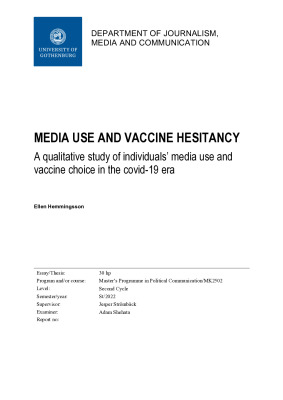MEDIA USE AND VACCINE HESITANCY
A qualitative study of individuals’ media use and vaccine choice in the covid-19 era
Vaccine hesitancy has long been recognized in separate research disciplines concerning different vaccines and societal contexts to comprehend what factors determine individuals’ vaccine choices. Likewise, communication scholars have distinguished how it is possible to select the information that aligns with pre-existing beliefs – particularly in the high-choice media environment with copious information channels. Considering that many
individuals stayed at home for large parts of 2020 and 2021, abundant opportunities existed to choose what information to consume. Thus, given the enormous supply of information related to covid-19, this might have affected individuals’ perceptions about the virus and later of the supplied vaccines, leading to vaccine hesitancy.
Therefore, this study departs from the field of political communication. The purpose is to examine how Swedish citizens who have not received a covid-19 vaccine reason regarding their decision and to understand their world of thinking concerning media use, virus-related information, and trust towards traditional media, as well as societal institutions and other members of the public. The main focus is, however, on media use. The study employs a qualitative method with a receptive approach and uses the theories of the Reinforcement Spirals Model and Selective Exposure as a prism through which the research process and analysis are performed. Semi-structured interviews were held with 20 Swedish citizens who had chosen not to take the vaccine. The gathered data was then
divided into a thematical analysis and shed light on different aspects related to media use, institutional and interpersonal trust, pandemic implications, and perceptions of vaccines.
The results suggest that a confirmation bias operates through selective exposure to vaccine information. The research also considers the Reinforcement Spirals Model, where some of the findings imply that the role of selfperceived
identity is an underlying aspect of vaccine hesitancy. Although the findings cannot be generalized to a larger population, the lack of societal debate and reporting on different perspectives from traditional media during
the pandemic caused a decrease in trust related to the mass media, the government, and associated agencies. As a result, many turned to other information sources, primarily online, where user-generated content seemed to reinforce their skepticism towards the establishments mentioned above. The research findings underline that it can
be problematic from a democratic stance if certain groups of people create counter-publics where alienation and suspicion of established democratic channels are encouraged and magnified, rather than feeling that they are allowed to participate in the mainstream public debate on equal terms as vaccinated citizens.

